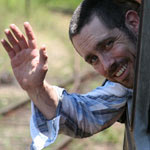Goooooooooooooooooooooooooooooooooooooooooooooooooooooooooooooooooooooooooooooooooooooooooooooooooooooooooooooooooooooooooooooooooooooooooooooooooooooooooooooooooooooooooooooooooooooooooooooooooooooooooooooooooooooooooooooooooooooooooooooooooooooooooooooooooooooooooooooooooooooooooooooooooooooooooooooooooooooooooooooooooooooooooooooooooooooooool!
Every night there is a football match on, and the commentators go absolutely crazy when a team scores. When Scholes scored for Man Utd recently, the commentator sang a song:
"Paul Scholes, Paul Scholes,
Paul Scholes, Paul Scholes,
Paul Scholes, Paul Scholes, Paul Scholes,
PAUL SCHOLES!!"
I tried to find a clip of it without success, but this is from the same guy, to give you a flavour
http://www.youtube.com/watch?v=M1UPlX6D-Bg
It's very funny, of course, but this kind of passion also has a darker side. Football violence here is on a scale that makes English hooligans look like kids. Court cases are often in the news. Six Newell's fans were murdered recently, one of them gunned down while drinking in a bar.
For weeks all the talk (punditry lasting six hours, for instance) has been about the big derby - El Superclassico - between Boca Juniors and River Plate, this Sunday. It's one of the most ferocious rivalries in world football. And I've got a ticket.
THING I DIDN'T KNOW BEFORE TODAY:
They use the word "hooligans" here, but it only applies to the English. In fact, they sometimes don't even put the word "English" in front of it, it is just assumed
 A glorious day. Not only was the sun shining, but it was the first day that I felt at all alone. Hired a mountain bike and a guide took us two of us on a short circuit. Scenery very Wild West.
A glorious day. Not only was the sun shining, but it was the first day that I felt at all alone. Hired a mountain bike and a guide took us two of us on a short circuit. Scenery very Wild West.














